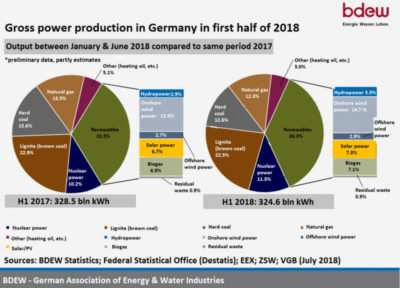Renewable energy met more of Germany’s electricity needs than coal during the first six months of 2018 — the longest period that renewables have been the country’s largest source of energy to date. According to new data from the German Association of Energy and Water Industries (BDEW), 36.3 percent of Germany’s electricity was generated by solar, wind, hydropower, and biogas between January and June of this year, while coal provided only 35.1 percent.
Compared to the same period in 2017, renewables made up only 32.5 percent of electricity needs, while coal made up 38.5 percent, according to Euractiv.
“Renewables are on the march,” BDEW CEO Stefan Kapferer told Clean Energy Wire, adding that the figures show a market-driven exit from coal in Germany is “already fully on its way.” However, Germany’s greenhouse gas emissions have not fallen in the past few years, despite the progress in renewable energy consumption and capacity. Recent research has shown that seven of Germany’s coal-fired power stations are among the top 10 carbon dioxide polluters in Europe.
Nevertheless, the German government is working on a plan to move completely away from coal, having launched a special commission in June to plan the transition.
—Christian Detisch


